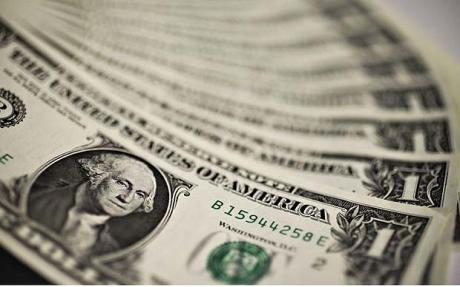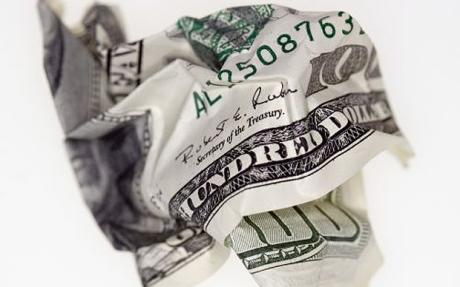
HSBC Bids Farewell to Dollar Supremacy
by Ambrose Evans-Pritchard
20 September 2009
from
Telegraph Website
|
The sun is setting on the US
dollar as the ultra-loose monetary policy of the US Federal Reserve
forces, China and the vibrant economies of the emerging world to
forge a new global currency order,
according to a new report by
HSBC. |

A dollar bill
All change: the dollar is losing ground as the world's reserve currency
Photo: Bloomberg News
"The dollar looks awfully like sterling
after the First World War," said David Bloom, the bank's currency
chief.
"The whole picture of risk-reward for emerging market currencies has
changed. It is not so much that they have risen to our standards, it is
that we have fallen to theirs. It used to be that sovereign risk was
mainly an emerging market issue but the events of the last year have
shown that this is no longer the case. Look at the UK – debt is racing
up to 100pc of GDP," he said
Crucially, China and rising Asia have reached
the point where they can no longer keep holding down their currencies to
boost exports because this is causing mayhem to their own economies, stoking
asset bubbles.
Asia's "mercantilist mindset" of recent decades
is about to be broken by the spectre of an inflation spiral.
The policy headache was already becoming clear in the final phase of the
global credit boom but the financial crisis temporarily masked the effect.
The pressures will return with a vengeance as these countries roar back to
life, leaving the US and other laggards of the old world far behind.
A monetary policy of near zero rates – further juiced by quantitative easing
– is completely incompatible with circumstances in most of,
-
Asia
-
the Middle East
-
Latin America
-
Africa
Divorce is inevitable.
The US is expected to hold rates near zero
through 2010 to tackle its own crisis.
What is occurring is an epochal loss in the relative wealth and economic
power of the old G10 bloc of rich countries compared to rising regions of
the world. The Euro, Yen, Sterling, Swiss Franc and other mature currencies
will be relegated along with the dollar in this great process of
rebalancing, but the Greenback will bear the brunt.
The Fed's super-loose policy is turning the dollar into the key funding
currency for the next phase of the global "carry trade", taking over the
role of Japan during its period of emergency stimulus.
Mr Bloom said regional currencies would emerge as the anchor for their
smaller trading partners, with China, Brazil, or South Africa substituting
the role of the US.
Australia is already linking its fortunes to
China through commodity ties.
UN Wants New Global Currency to Replace
Dollar
by Edmund Conway
Economics Editor
07 September 2009
from
Telegraph Website
|
The dollar should be replaced
with a global currency, the
United Nations has said, proposing
the biggest overhaul of the world's monetary system since the Second
World War. |

A number of countries,
including China and Russia,
have suggested replacing the
dollar as the world's reserve currency
In a radical report, the UN Conference on
Trade and Development (UNCTAD)
has said the system of currencies and capital rules which binds the world
economy is not working properly, and was largely responsible for the
financial and economic crises.
It added that the present system, under which the dollar acts as the world's
reserve currency , should be subject to a wholesale reconsideration.
Although a number of countries, including China and Russia, have suggested
replacing the dollar as the world's reserve currency, the UNCTAD report is
the first time a major multinational institution has posited such a
suggestion.
In essence, the report calls for a new
Bretton Woods-style system of managed
international exchange rates, meaning central banks would be forced to
intervene and either support or push down their currencies depending on how
the rest of the world economy is behaving.
The proposals would also imply that surplus nations such as China and
Germany should stimulate their economies further in order to cut their own
imbalances, rather than, as in the present system, deficit nations such as
the UK and US having to take the main burden of readjustment.
"Replacing the dollar with an artificial
currency would solve some of the problems related to the potential of
countries running large deficits and would help stability," said
Detlef Kotte, one of the report's authors.
"But you will also need a system of managed
exchange rates. Countries should keep real exchange rates [adjusted for
inflation] stable. Central banks would have to intervene and if not they
would have to be told to do so by a multilateral institution such as the
International Monetary Fund."
The proposals, included in UNCTAD's annual
Trade and Development Report , amount to the most radical suggestions
for redesigning the global monetary system.
Although many economists have pointed out that the economic crisis owed more
to the malfunctioning of the post-Bretton Woods system, until now no major
institution, including
the G20, has come up with an alternative.


